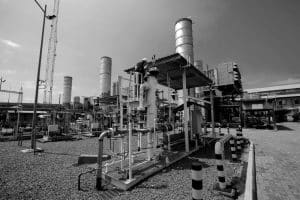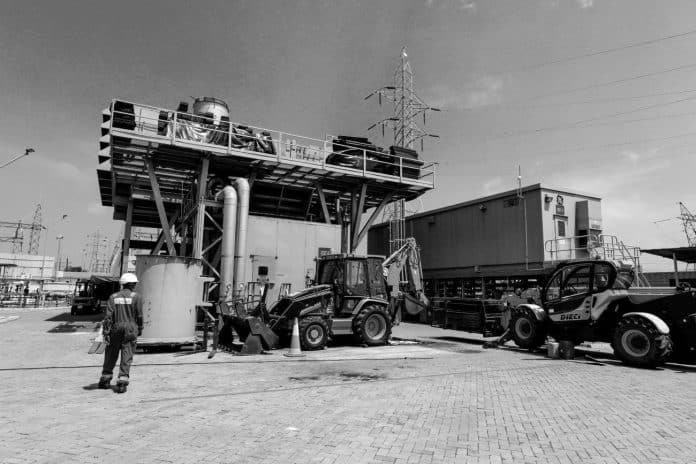Introduction to Ubungo I Thermal Power Station
In the heart of Tanzania’s bustling capital city, Dar es Salaam, lies the Ubungo I Thermal Power Station – a critical infrastructure asset that has been powering the city’s remarkable urban growth for over a decade. As the country’s largest and most efficient thermal power plant, Ubungo I plays a pivotal role in ensuring a reliable and sustainable electricity supply, fueling the economic and social development of the region.
Importance of Reliable Power Supply in Urban Areas

Reliable access to electricity is the lifeblood of any thriving urban center. It powers the lights, appliances, and machinery that enable businesses to operate, hospitals to provide life-saving care, and homes to function with modern conveniences. In the rapidly expanding city of Dar es Salaam, the demand for electricity has soared in recent years, driven by population growth, industrialization, and the rising aspirations of its citizens.
The Ubungo I Thermal Power Station has been instrumental in meeting this growing energy demand, ensuring that Tanzania’s commercial and administrative hub can continue to flourish and attract new investments. By providing a stable and abundant supply of electricity, the power station has played a pivotal role in supporting the city’s urban infrastructure, job creation, and overall quality of life for its residents.
Overview of the Ubungo I Thermal Power Station Project
The Ubungo I Thermal Power Station was commissioned in 2009 as a joint venture between the Tanzanian government and the private sector. The project was conceived as a strategic initiative to address the country’s chronic power shortages and support the rapid urbanization of Dar es Salaam. With an initial installed capacity of 150 megawatts (MW), the power station has since undergone several expansions, increasing its total output to a remarkable 285 MW.
The Ubungo I Thermal Power Station is a testament to Tanzania’s commitment to sustainable energy development and its efforts to harness the country’s abundant natural gas resources. By leveraging these resources, the power station has not only enhanced the reliability of the national grid but also contributed to the diversification of Tanzania’s energy mix, reducing the country’s reliance on hydropower, which can be vulnerable to fluctuations in rainfall.
Technical Features and Capacity of the Power Station
The Ubungo I Thermal Power Station is a state-of-the-art facility that utilizes the latest in power generation technology. The power station’s six high-efficiency gas turbines are designed to operate on natural gas, ensuring a clean and efficient energy source. These turbines are capable of generating up to 47.5 MW each, making the Ubungo I Thermal Power Station one of the most powerful thermal power plants in the country.
In addition to its impressive generation capacity, the power station boasts advanced control systems and monitoring technologies that enable real-time optimization of its operations. This ensures that the plant operates at peak efficiency, minimizing fuel consumption and reducing environmental impact. The facility also features a robust transmission infrastructure, including high-voltage substations and transmission lines, that seamlessly integrates the power generated into the national grid, ensuring a reliable and consistent supply of electricity to the city of Dar es Salaam and the surrounding regions.
Environmental Considerations and Sustainability Initiatives
The Ubungo I Thermal Power Station has been designed and operated with a strong focus on environmental sustainability. The power station’s use of natural gas as its primary fuel source significantly reduces its carbon footprint compared to traditional coal-fired power plants. Additionally, the facility has implemented a range of measures to minimize its environmental impact, including:
- Emissions Control: The power station employs state-of-the-art emissions control systems to reduce the release of pollutants, such as nitrogen oxides (NOx) and carbon monoxide (CO), into the atmosphere.
- Water Management: The power station has implemented a comprehensive water management system that includes wastewater treatment and recycling, ensuring that water resources are used efficiently and responsibly.
- Waste Management: The facility has established robust waste management protocols to ensure the proper disposal and/or recycling of hazardous materials, reducing the environmental footprint of its operations.
- Biodiversity Conservation: The power station’s development has been carefully planned to minimize the impact on local biodiversity, with measures in place to protect nearby ecosystems and wildlife habitats.
These sustainability initiatives demonstrate the Ubungo I Thermal Power Station’s commitment to operating in an environmentally responsible manner, contributing to the overall sustainability of Tanzania’s energy sector.
Socio-economic Impact of the Power Station on Urban Growth

The Ubungo I Thermal Power Station has had a profound impact on the socio-economic development of Dar es Salaam and the surrounding regions. By providing a reliable and abundant supply of electricity, the power station has been a catalyst for urban growth, supporting the expansion of businesses, industries, and residential areas.
Job Creation: The construction and operation of the Ubungo I Thermal Power Station have generated thousands of direct and indirect employment opportunities, from engineering and technical roles to support services. This has contributed to the growth of the local job market and the improvement of living standards for the surrounding communities.
Industrial Development: The availability of reliable electricity has attracted a wide range of industries to Dar es Salaam, including manufacturing, technology, and service sectors. This influx of businesses has led to the creation of new job opportunities, increased tax revenues, and the overall economic prosperity of the city.
Infrastructure Improvements: The power station’s infrastructure, including transmission lines and substations, has also enabled the development of other critical urban infrastructure, such as roads, water supply systems, and telecommunications networks. These improvements have enhanced the quality of life for Dar es Salaam’s residents and made the city more attractive for further investment and development.
Social Welfare: The reliable power supply provided by the Ubungo I Thermal Power Station has had a positive impact on social welfare, improving access to essential services such as healthcare, education, and household amenities. This has contributed to the overall well-being and quality of life for the city’s residents.
Challenges and Solutions in Operating the Power Station
Operating a large-scale thermal power plant like the Ubungo I Thermal Power Station is not without its challenges. The facility’s management team has had to navigate a range of technical, operational, and logistical hurdles to ensure the power station’s smooth and efficient functioning.
Fuel Supply Management: Ensuring a consistent and reliable supply of natural gas to fuel the power station’s turbines is a critical challenge. The Ubungo I Thermal Power Station has worked closely with Tanzania’s natural gas producers and transporters to develop robust supply chain management strategies, mitigating the risk of fuel shortages.
Maintenance and Upgrades: Maintaining the power station’s complex machinery and infrastructure is an ongoing process that requires meticulous planning, skilled technicians, and regular upgrades. The facility’s management team has implemented comprehensive maintenance protocols and invested in the latest technologies to optimize the power station’s performance and longevity.
Grid Integration and Stability: Integrating the power generated by the Ubungo I Thermal Power Station into the national grid, while ensuring grid stability and reliability, is another key challenge. The facility’s advanced control systems and coordination with the national grid operator have been instrumental in addressing this challenge.
Workforce Development: Ensuring a skilled and knowledgeable workforce to operate and maintain the power station is crucial. The Ubungo I Thermal Power Station has invested in comprehensive training programs and partnerships with local educational institutions to develop a pipeline of talented engineers and technicians.
By proactively addressing these challenges through innovative solutions and strategic partnerships, the Ubungo I Thermal Power Station has been able to maintain its position as a reliable and efficient power provider, supporting the continued growth and development of Dar es Salaam.
Future Developments and Expansion Plans for Ubungo I Thermal Power Station
The Ubungo I Thermal Power Station’s success has prompted the Tanzanian government and its private sector partners to explore opportunities for further expansion and development. These plans aim to not only increase the power station’s generation capacity but also enhance its overall efficiency and sustainability.
Capacity Expansion: The Ubungo I Thermal Power Station is currently undergoing a major expansion project that will add an additional 185 MW of generation capacity to the facility. This will bring the power station’s total installed capacity to a remarkable 470 MW, solidifying its position as the largest thermal power plant in Tanzania.
Technological Upgrades: The power station’s management team is also exploring the implementation of advanced technologies, such as combined-cycle gas turbines and waste heat recovery systems, to further improve the facility’s efficiency and reduce its environmental impact.
Diversification of Energy Sources: In line with Tanzania’s broader energy diversification strategy, the Ubungo I Thermal Power Station is also exploring the integration of renewable energy sources, such as solar photovoltaic (PV) systems, to complement its natural gas-fired generation.
Collaboration with Local Communities: The power station’s management team is committed to strengthening its engagement with local communities, ensuring that the facility’s operations and expansion plans are aligned with the needs and aspirations of the surrounding population. This includes initiatives to support local economic development, environmental conservation, and social welfare programs.
These future developments and expansion plans for the Ubungo I Thermal Power Station underscore the facility’s critical role in powering Tanzania’s urban growth and the government’s commitment to sustainable energy development.
Collaboration with Local Communities and Stakeholders
The Ubungo I Thermal Power Station’s success is not just a testament to its technical prowess and operational efficiency, but also to the strong collaboration and engagement with local communities and stakeholders. The power station’s management team has recognized the importance of fostering positive relationships with the surrounding neighborhoods, government agencies, and other key stakeholders.
Community Engagement: The power station has established dedicated community outreach programs, engaging with local residents to understand their needs and concerns. This has led to the implementation of various social and environmental initiatives, such as infrastructure improvements, educational programs, and environmental conservation projects, that directly benefit the surrounding communities.
Stakeholder Collaboration: The Ubungo I Thermal Power Station has also forged strong partnerships with government agencies, regulatory bodies, and industry associations to ensure its operations align with national energy policies and environmental regulations. This collaborative approach has enabled the power station to navigate the complex regulatory landscape and contribute to the development of Tanzania’s energy sector.
Capacity Building: The power station’s management team has also invested in capacity-building initiatives, providing training and skills development opportunities for local technicians and engineers. This not only enhances the power station’s operational capabilities but also contributes to the growth of a skilled workforce in the region.
Sustainable Development: By prioritizing community engagement and stakeholder collaboration, the Ubungo I Thermal Power Station has demonstrated its commitment to sustainable development, ensuring that its operations create long-term value for the local communities and the nation as a whole.
Conclusion: Ubungo I Thermal Power Station – Powering Urban Growth in Tanzania
The Ubungo I Thermal Power Station stands as a shining example of how strategic investments in energy infrastructure can catalyze urban growth and development. As the largest and most efficient thermal power plant in Tanzania, the facility has played a pivotal role in providing a reliable and abundant supply of electricity to the rapidly expanding city of Dar es Salaam and the surrounding regions.
Through its technical excellence, environmental stewardship, and strong community engagement, the Ubungo I Thermal Power Station has become a symbol of Tanzania’s commitment to sustainable energy development and its determination to power the nation’s urban growth. As the country continues to evolve and modernize, the Ubungo I Thermal Power Station will undoubtedly remain a cornerstone of the nation’s energy infrastructure, driving economic prosperity and improving the quality of life for its citizens.
For more articles related to Energy in Tanzania click here!
































